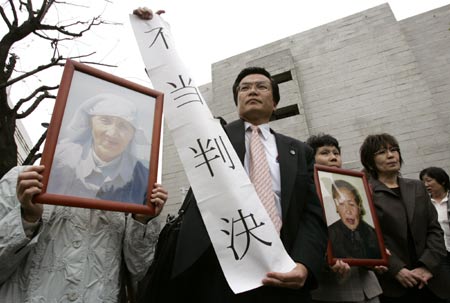Repentance acts 'study in contrast'
By Qin Jize (China Daily)Updated: 2007-06-14 06:55
|
|
The contrast between official and societal attitudes of Germany and Japan toward lingering war issues shows how much the latter is still in denial and refuses to accept its share of responsibility, say analysts.
The comments came as Germany on Tuesday formally completed its payments program for people coerced to work for the Nazi while Japan's top court recently rejected an appeal by Chinese citizens seeking government compensation for using them as wartime slave laborers.
| |||
He said: "Germany expressed deep remorse for the past through legislation as well as administrative methods, which are very effective".
A Berlin-based foundation called Remembrance, Responsibility and the Future has paid more than 4.37 billion euros ($5.83 billion) to 1.7 million former slave laborers or their descendents in more than 100 countries since it was founded seven years ago.
"Many of the prisoners didn't survive this martyrdom, and the ones who did are physically and mentally marked. They could barely overcome the trauma from these inhumane times," German Chancellor Angela Merkel said during a ceremony in Berlin to commemorate the completion of payments.
It marked a milestone when "it has finally been possible to grant many former slave laborers the humanitarian aid they were promised," she said.
German companies paid half of the 10.1 billion deutsche marks ($6.9 billion) to the fund while the German government provided the rest.
"The law establishing the fund was intended to make up for a failure," Michael Jansen, the fund's chief executive officer, said in a statement.
"Together with German industry, the German parliament acknowledged the moral and political responsibility for Nazi victims and for the people forced into slave labor by the Nazi regime." The fund will continue to operate and will support educational and humanitarian projects in the countries which have suffered most under the Nazis.
While Germany is putting a full stop to its invasion history and moving forward, Japan's actions are starkly inadequate, he said.
Jin said the lack of legislation, the political atmosphere and public support have decided Japan's attitude toward history.
"Shirking historical responsibility makes it impossible for Japan to get rid of the shadow of the war forever," Jin said.
The ruling by Japan's Supreme Court said the plaintiffs could not seek compensation because a 20-year statute of limitations had expired and the current government was not responsible for the wrongdoings of leaders who followed the wartime constitution.
Agencies contributed to the story
(China Daily 06/14/2007 page2)
|
||
|
||
|
|

